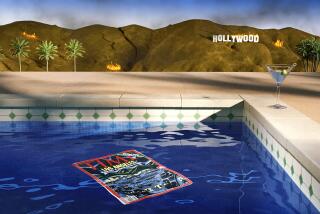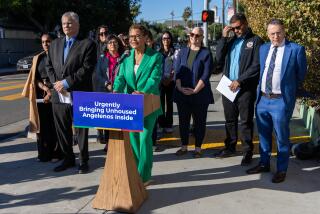Commentary : His Hometown Is Coming Apart at Seams
- Share via
MIAMI — From the Omni International Hotel, where the Cincinnati Bengals are staying this week, it’s a short walk to Overtown, a section that the chamber of commerce does not recommend to tourists.
Eddie Brown made the walk on Monday in the company of a teammate, James Brooks. Brown is no tourist. The wide receiver grew up in the area and in adjacent Liberty City.
“We wanted to get haircuts,” he said. “A lot of places were closed. We saw a little of the (Martin Luther King Jr. Day) parade. Then we had lunch at Popeye’s Chicken.”
Brown thought he might encounter some old friends from the neighborhood. That was not the case. What he saw depressed him. It was worse than he remembered. Boarded-up stores. Men his age hanging out. Still, he was not prepared for the news when he returned to his hotel room after fulfilling a cable television commitment on Monday night.
According to reports, violence had flared in Overtown after a motorcyclist, Clement Lloyd, was killed and his passenger injured in a high-speed chase with police. The passenger, Allan Blanchard, later died of head wounds sustained when the motorcycle crashed.
Bottles were thrown. Gunfire was exchanged. Streets were cordoned off. It triggered memories for Brown, memories of a difficult time in his hometown.
Two key members of the San Francisco 49ers, who will play the Bengals in Super Bowl XXIII, were teammates of Brown at the University of Miami. But neither Kevin Fagan nor Danny Stubbs, defensive ends for the 49ers, was a native. Of all the participants in Sunday’s spectacle at Joe Robbie Stadium, only Brown was a witness to Miami burning in 1980.
He was 17, a star athlete at Miami Senior High School, at the time of the first and most destructive of the four serious racial disturbances that have plagued the city in this decade. Strangely enough, he was on his way home from a movie theater in the Omni complex, several floors below the hotel room he occupies this week.
“We were living in Liberty City then,” he said. “I was on a bus. The buses had to stop running. I was on the last bus going out. I saw the flames. I could hear the gunfire. But I didn’t find out until I got home what it was all about.
“It took at least three, four days to get back to normal. The first two days were the worst. People were out there looting. I only went as far as my front porch. I didn’t have any desire to go outside.”
The rioting, mostly in Liberty City, left 18 dead and 400 hospitalized and inflicted property damage of $100 million.
Additionally, that incident contributed to an image that has taken Miami years to overcome. The situation has been exacerbated by an influx of refugees from Cuba, Haiti and now Nicaragua, transforming the city into a modern-day Ellis Island. And the television show “Miami Vice,” with its emphasis on crime and drugs, has not helped.
Fagan and Stubbs said they tried to assure teammates that such unrest was not an everyday occurrence. “I was mostly shocked when I heard about it on the radio,” Stubbs said. “It’s not the Miami I know. I think you’ve got to be careful in all big cities. Even when we played in London, they told us where not to go.”
Stubbs was recruited by the University of Miami from Red Bank, N.J. On his visit to the school, he said, he asked to be taken to Overtown because he had read so much about it. “I thought it was like the South Bronx,” he said. But he also spoke to schoolchildren there as part of former coach Howard Schnellenberger’s campaign to link the school with the community. “There’s a lot of friendly people there,” Stubbs said. “I feel sorry for the kids and the elderly people who get caught up in this.”
The timing of the violence was a blow to Miami Superhost ‘89, the committee that is promoting the NFL championship game as a celebration of what it terms “an international metropolis pulsating with the energies of its growing multi-ethnic population.”
“Miami’s a large and complex urban area,” committee president Charles Scurr said, “and there are going to be problems. We’re not trying to shy away from them. But it’s important to put this in perspective and do the whole story of Miami.”
Scurr did admit that when he got word of the incident Monday night his first reaction was “expletive deleted.” To his credit, Mayor Xavier Suarez did not spend time polishing the city’s image at a news conference. “I avoided making a reference to the fact that the timing was bad yesterday,” he said. “For a tragic incident like this, the timing is always bad.”
The mayor also noted that the Miami Police Department was plagued with corruption in the past and said “we will institute any reforms in the department that will decrease the chance of unprovoked shooting.” He walked through the neighborhood Monday night, without police protection, and returned Tuesday. He said the government was listening.
For his part, Eddie Brown hopes that that is the case. “I didn’t have any problems with the police growing up,” he said. “But things have changed. It seems to be problems between the police and the community that really sets things off. I don’t think they have any desire for each other.
“I feel frustrated and embarrassed. We’re here from Cincinnati and San Francisco to play a game and there are a lot of people from other states here. I wanted it to be better. This is a positive place for me. I was born here.”
Brown makes his off-season home in Kendall, a suburb south of Miami. He has relocated his mother in Coral Gables, near the Miami campus. But he hurts for those left behind. “Most people, if they have a chance, they get out,” he said. “There’s not many jobs. All the people who came over took jobs from a lot of people already here. And the redeveloping they’re doing, people have to move because they’re doing over the area.”
Standing on the sideline at Joe Robbie Stadium, an hour after Brown spoke about home, Harry Edwards, a professor at the University of California, addressed the issue. The black activist, who serves as a counselor to 49ers players, talked about the situation in Miami as a “boiling cauldron.” He also said the violence in the streets should not obscure the game.
“Anytime people tune in for four hours to one event, it’s important,” Edwards said. “Even though some consider it the toy department of life, it’s important. It’s part of the human experience. Overtown also is part of the human drama. I don’t think the media should ignore either.”
That didn’t seem to be the case Tuesday in what was becoming a tale of two cities, one of glass skyscrapers and soaring civic pride, the other of boarded-up stores and mounting rage. “There are no underdogs at the Super Bowl,” Edwards said in his discourse on the game’s ramifications. But there continue to be underdogs in Miami, starting with residents of Overtown.
More to Read
Go beyond the scoreboard
Get the latest on L.A.'s teams in the daily Sports Report newsletter.
You may occasionally receive promotional content from the Los Angeles Times.










